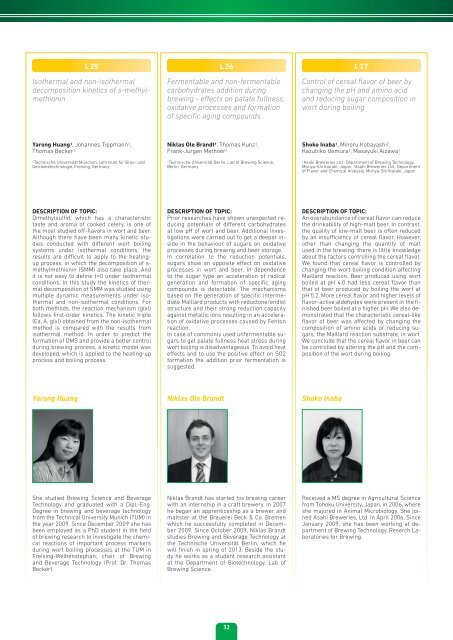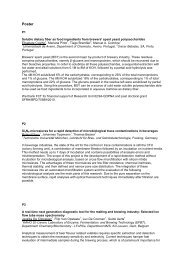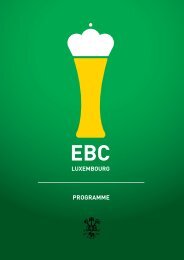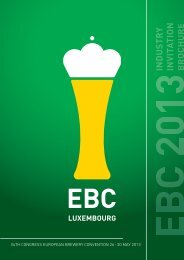please click here for download. - the 34th European Brewery ...
please click here for download. - the 34th European Brewery ...
please click here for download. - the 34th European Brewery ...
You also want an ePaper? Increase the reach of your titles
YUMPU automatically turns print PDFs into web optimized ePapers that Google loves.
L 25<br />
Iso<strong>the</strong>rmal and non-iso<strong>the</strong>rmal<br />
decomposition kinetics of s-methylmethionin<br />
L 26<br />
Fermentable and non-fermentable<br />
carbohydrates addition during<br />
brewing - effects on palate fullness,<br />
oxidative processes and <strong>for</strong>mation<br />
of specific aging compounds<br />
L 27<br />
Control of cereal flavor of beer by<br />
changing <strong>the</strong> pH and amino acid<br />
and reducing sugar composition in<br />
wort during boiling<br />
Yarong Huang 1 , Johannes Tippmann 1 ,<br />
Thomas Becker 1<br />
1Technische Universität München, Lehrstuhl für Brau- und<br />
Getränketechnologie, Freising, Germany<br />
Niklas Ole Brandt 1 , Thomas Kunz 1 ,<br />
Frank-Jürgen Methner 1<br />
1Technische Universität Berlin, Lab of Brewing Science,<br />
Berlin, Germany<br />
Shoko Inaba 1 , Minoru Kobayashi 2 ,<br />
Kazuhiko Uemura 1 , Masayuki Aizawa 1<br />
1Asahi Breweries Ltd., Department of Brewing Technology,<br />
Moriya-Shi Ibaraki, Japan, 2 Asahi Breweries Ltd., Department<br />
of Flavor and Chemical Analysis, Moriya-Shi Ibaraki, Japan<br />
DESCRIPTION OF TOPIC:<br />
Dimethylsulfid, which has a characteristic<br />
taste and aroma of cooked celery, is one of<br />
<strong>the</strong> most studied off-flavors in wort and beer.<br />
Although t<strong>here</strong> have been many kinetic studies<br />
conducted with different wort boiling<br />
systems under iso<strong>the</strong>rmal conditions, <strong>the</strong><br />
results are difficult to apply to <strong>the</strong> heatingup<br />
process, in which <strong>the</strong> decomposition of s-<br />
methylmethionin (SMM) also take place. And<br />
it is not easy to define t=0 under iso<strong>the</strong>rmal<br />
conditions. In this study <strong>the</strong> kinetics of <strong>the</strong>rmal<br />
decomposition of SMM was studied using<br />
multiple dynamic measurements under iso<strong>the</strong>rmal<br />
and non-iso<strong>the</strong>rmal conditions. For<br />
both methods, <strong>the</strong> reaction mechanism (g(x))<br />
follows first-order kinetics. The kinetic triple<br />
(Ea, A, g(x)) obtained from <strong>the</strong> non-iso<strong>the</strong>rmal<br />
method is compared with <strong>the</strong> results from<br />
iso<strong>the</strong>rmal method. In order to predict <strong>the</strong><br />
<strong>for</strong>mation of DMS and provide a better control<br />
during brewing process, a kinetic model was<br />
developed, which is applied to <strong>the</strong> heating-up<br />
process and boiling process.<br />
DESCRIPTION OF TOPIC:<br />
Prior researches have shown unexpected reducing<br />
potentials of different carbohydrates<br />
at low pH of wort and beer. Additional investigations<br />
were carried out to get a deeper inside<br />
in <strong>the</strong> behaviour of sugars on oxidative<br />
processes during brewing and beer storage.<br />
In correlation to <strong>the</strong> reduction potentials,<br />
sugars show an opposite effect on oxidative<br />
processes in wort and beer. In dependence<br />
to <strong>the</strong> sugar type an acceleration of radical<br />
generation and <strong>for</strong>mation of specific aging<br />
compounds is detectable. The mechanisms<br />
based on <strong>the</strong> generation of specific intermediate<br />
Maillard products with reductone/endiol<br />
structure and <strong>the</strong>ir strong reduction capacity<br />
against metallic ions resulting in an acceleration<br />
of oxidative processes caused by Fenton<br />
reaction.<br />
In case of commonly used unfermentable sugars<br />
to get palate fullness heat stress during<br />
wort boiling is disadvantageous. To avoid heat<br />
effects and to use <strong>the</strong> positive effect on SO2<br />
<strong>for</strong>mation <strong>the</strong> addition prior fermentation is<br />
suggested.<br />
DESCRIPTION OF TOPIC:<br />
An overabundance of cereal flavor can reduce<br />
<strong>the</strong> drinkability of high-malt beer. In contrast,<br />
<strong>the</strong> quality of low-malt beer is often reduced<br />
by an insufficiency of cereal flavor. How ever,<br />
o<strong>the</strong>r than changing <strong>the</strong> quantity of malt<br />
used in <strong>the</strong> brewing, t<strong>here</strong> is little knowledge<br />
about <strong>the</strong> factors controlling <strong>the</strong> cereal flavor.<br />
We found that cereal flavor is controlled by<br />
changing <strong>the</strong> wort boiling condition affecting<br />
Maillard reaction. Beer produced using wort<br />
boiled at pH 4.0 had less cereal flavor than<br />
that of beer produced by boiling <strong>the</strong> wort at<br />
pH 5.2. More cereal flavor and higher levels of<br />
flavor-active aldehydes were present in <strong>the</strong> finished<br />
beer boiled at a higher pH. We also demonstrated<br />
that <strong>the</strong> characteristic cereal-like<br />
flavor of beer was affected by changing <strong>the</strong><br />
composition of amino acids or reducing sugars,<br />
<strong>the</strong> Maillard reaction substrate, in wort.<br />
We conclude that <strong>the</strong> cereal flavor in beer can<br />
be controlled by altering <strong>the</strong> pH and <strong>the</strong> composition<br />
of <strong>the</strong> wort during boiling.<br />
Yarong Huang<br />
Niklas Ole Brandt<br />
Shoko Inaba<br />
She studied Brewing Science and Beverage<br />
Technology and graduated with a Dipl.-Eng.<br />
Degree in brewing and beverage technology<br />
from <strong>the</strong> Technical University Munich (TUM) in<br />
<strong>the</strong> year 2009. Since December 2009 she has<br />
been employed as a PhD student in <strong>the</strong> field<br />
of brewing research to investigate <strong>the</strong> chemical<br />
reactions of important process markers<br />
during wort boiling processes at <strong>the</strong> TUM in<br />
Freising-Weihenstephan, chair of Brewing<br />
and Beverage Technology (Prof. Dr. Thomas<br />
Becker).<br />
Niklas Brandt has started his brewing career<br />
with an internship in a craft brewery. In 2007<br />
he began an apprenticeship as a brewer and<br />
maltster at <strong>the</strong> Brauerei Beck & Co. Bremen<br />
which he successfully completed in December<br />
2009. Since October 2009, Niklas Brandt<br />
studies Brewing and Beverage Technology at<br />
<strong>the</strong> Technische Universität Berlin, which he<br />
will finish in spring of 2013. Beside <strong>the</strong> study<br />
he works as a student research assistant<br />
at <strong>the</strong> Department of Biotechnology, Lab of<br />
Brewing Science.<br />
Received a MS degree in Agricultural Science<br />
from Tohoku University, Japan, in 2006, w<strong>here</strong><br />
she majored in Animal Microbiology. She joined<br />
Asahi Breweries, Ltd. in April 2006. Since<br />
January 2009, she has been working at department<br />
of Brewing Technology, Reserch Laboratories<br />
<strong>for</strong> Brewing.<br />
32





